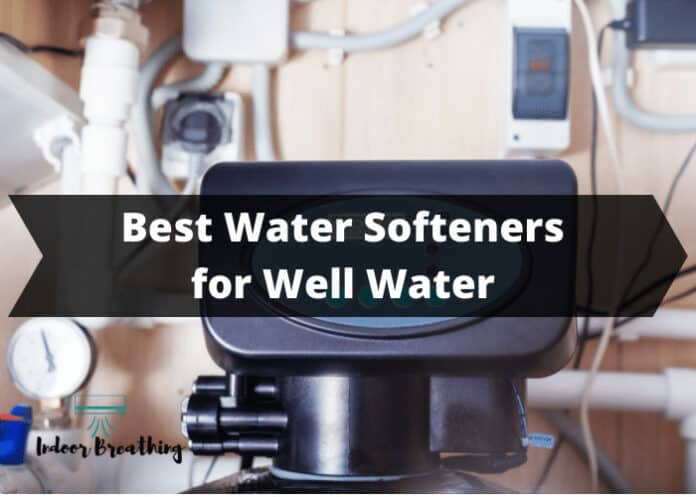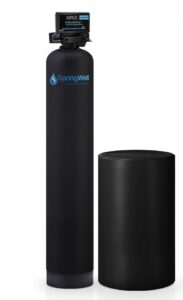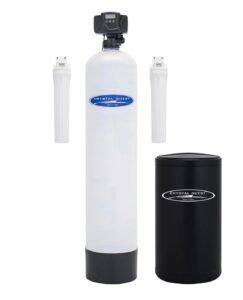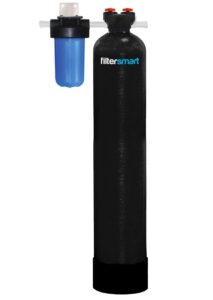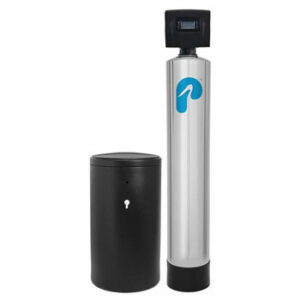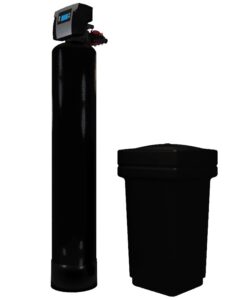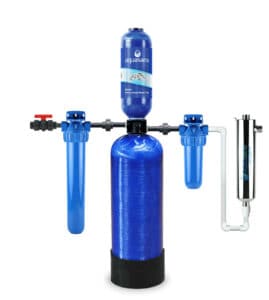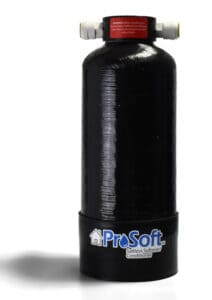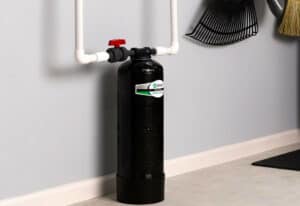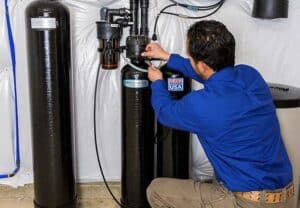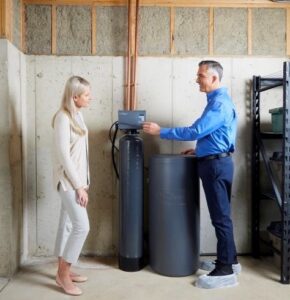With several mineral contents, volatile organic substances, and microbial contaminants found in well water, you need to get your hands on the best water softeners for well water in 2022.
You must have gone through a diverse range of water softeners with many features varying from one another. It is confusing to get your hands on the best water softeners.
Dive in to have a look at the detailed guide about the best water softeners.
Table of Contents
Best Water Softeners for Well Water
-
Best Overall: Springwell Salt Based Water Softener System
This version of Springwell’s salt-based water softener has gotten to our stunning list due to some outstanding plus noteworthy features. It is a salt-based water softener system based on the ion-exchange principle.
This salt-based Springwell water softener comes with certified components; therefore, its effectiveness and durability are unquestionable. This unique system head may also control by Bluetooth using Spring Well’s app.
When it comes to the resin bed, it’s worth noting that it includes pre-loading in the system, avoiding the need to fill it manually. Therefore, forget about spending money on it for around eight years.
Even though you utilize all the showers, Spring Well emphasizes the necessity of “zero pressure drop.” The website offers information you’ll need to figure out the type of water softener for you. You can also save a huge amount of detergent by installing Spring Well salt water softeners.
Pros
- It’s simple to control and operate, thanks to Bluetooth technology.
- Maintains water pressure.
- The resin is pre-filled.
- The refund policy of six months.
Cons
- Slightly expensive.
Summary:
Spring Well’s salt-based water softener system is the best based on its durability, stunning results, and salt usage. You can trust them for indulging in excellent results.
| Available | On | Amazon | ||
|---|---|---|---|---|
| Add To Cart |  | S Springwell Water Filtration Systems | Prime | |
| Add To Cart |  | Crystal Quest | Prime | |
| Add To Cart | 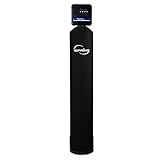 | iSpring | PrimeEligible | |
| Add To Cart |  | Kazravan Enterprises LLC | PrimeEligible |
-
Well Water Softener Alternative: Crystal Quest with Pre/Post Filtration
Heavy metals, pesticides, pharmaceutical by-products, even chlorine are separate from water with the Crystal Quest SMART Water Filter’s six filtration stages.
This filter can be used in conjunction with Crystal Quest Softener or the Salt-free Conditioner.
Sediments pre-filter, a SMART multipurpose filter, and a carbon filter inside the Crystal Quest filtration system (with standard plus catalytic carbon filter combined with an ion exchange resin). Ceramic, as well as Tourmaline balls, help in improving the pH level with the alkalinity of water.
Ion exchange in Crystal Quest’s conventional water softener removes magnesium and calcium ions. Hardness minerals are transformed into calcite crystals, which cannot cling to surfaces and create scale in the salt-free alternative.
The Crystal Quest water filtration system is available in two variants: 1.5 + cubic feet (which goes well for households with around three bathrooms) or 2.0 + cubic feet (for homes with more than three bathrooms). Both the saltless conditioner and softener are available in sizes ranging from 1,000,000 to 1,500,000 gallons.
Pros
- A traditional softening method to work.
- Large water filters.
- Ideal pH level.
- It’s possible to utilize it with potassium chloride (which is healthier than sodium).
Cons
- It takes up extra space.
- Needs salt replenishment.
Summary:
Considering the lifetime warranty with 1500000 gallons of capacity and 48K grain capacity with 9-11 GPM flow rate makes this water softener system a mesmerizing choice.
-
Salt-Free Water Softener Alternative System
The Filtersmart water system effectively removes a plethora of toxins and impurities in water, including volatile organic compounds, chloramines, chlorine, herbicides, and pesticides, plus soluble organic compounds making use of its activated carbon coconut shell filter.
The best thing about Filtersmart technology is that it conditions water without using either salt or power as it’s a type of salt-free softener.
This doesn’t need to regenerate. It wouldn’t waste any water throughout the entire conditioning process, all while generating soft water that won’t scale up any appliances. These softener system tanks don’t require any maintenance, plus your water would start flowing from the taps as well.
What you’ll love about the Filtersmart water system works as a water conditioner, which means that instead of eliminating calcium magnesium, it converts them into small nanocrystals suspended within the water, preventing scale formation impossible inside appliances plus pipes.
From the outside, the water system resembles a salt-based water softener with media mineral tanks; however, it does not utilize ion exchange. There is no need to change media frequently. The Filtersmart doesn’t soften water since the minerals remain in the water, offering benefit!
Pros
- Featuring water filtration plus conditioning, it provides twice the value.
- Mineral tanks come with a lifetime warranty.
- Do not include salt in the water.
- Uses NSF-certified specialized carbon filters of the finest quality.
- It requires less management than a traditional salt-based water softener system.
Cons
- You should change the water filter regularly.
- Installing this water softener is quite difficult.
Summary:
If you wish to have filtered, soft water in the home, the Filtersmart Whole House is an ideal solution. Overall, it’s a perfect Water Filter and an ideal Salt-Free Softener, which is the most suitable option. It features around 1,000,000 gallons to generate fantastic water quality right from the home’s faucets.
-
SpringWell Future Soft Salt-Free Water Softener
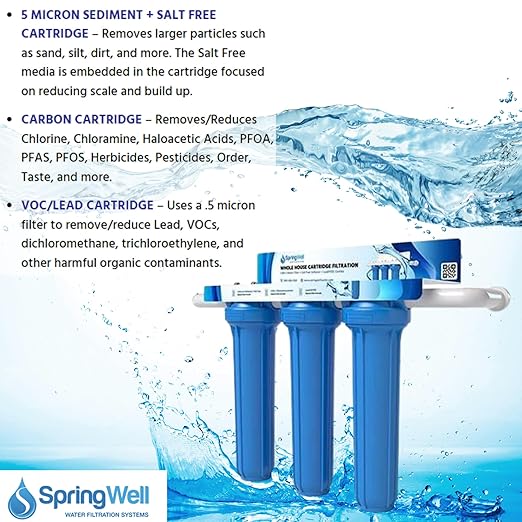
The Springwell water softener is a good choice for households looking for a saltless water softener. This water softener lacks rechargeable resin, which necessitates time-consuming backwashing and regeneration. The salt-free formulation is also great for those who don’t want extra sodium in water.
This solution acts as a well water conditioner, preventing limescale buildup without adding salts in water or eliminating important minerals. Rather, it removes 99.6% amount of chlorine, as well as its concomitant odor and taste, making your water drinkable.
This water softener comes with a kinetic degradation fluxion filter which helps in water conditioning, while this water softener also comes with a catalytic coconut shell carbon filter that increases the aesthetic aspects of the well water. This process removes heavy metals, organic compounds, minerals, and other particles from well water
You’ll love this water softener because it features the ActivFlo technology, which is wonderful. Filtration is more efficient with a longer contact length, leading to a cleaner, healthier, and safer well water. Consumers will appreciate the improved overall quality of water provided by this stunning water softener.
However, this technique does not eliminate microbes. Consumers may consider installing a UV filtration system or reverse osmosis in their homes.
Pros
- Removes pollutants from water along with high chlorine levels.
- KDF filter featured in this softener of superior quality.
- Coconut shell carbon filter featuring high catalytic performance.
- ActivFlo technology is unique in that it does not require regeneration.
Cons
- It does not get rid of bacteria.
Summary:
Overall, Springwell water softener, which is salt-free, is a perfect choice for households concerned with health-conscious drinking of water. It is ideal for limiting the mineral and hard water content along with the impurities.
| Available | On | Amazon | ||
|---|---|---|---|---|
| Add To Cart |  | S Springwell Water Filtration Systems | Prime | |
| Add To Cart | 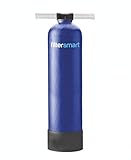 | Filtersmart | Prime | |
| Add To Cart |  | OMNIFilter | PrimeEligible | |
| Add To Cart |  | SoftPro Water Systems | Prime | |
| Add To Cart |  | iFilters | Prime |
-
Pentair Salt-Based Water Softeners
Pentair’s Pelican water softening system is an easy solution to the hard water problem. Well, water coming from any source to our homes is hard.
They have an extensive amount of magnesium and calcium present, forming a scale. It also prevents soaps from lathering and even affects the skin and hair, making them dry and rough.
The Pentair’s Pelican Advantage series makes sure you get scale-free water in your taps. The softening of the water is done when the water passes through the tank.
The tank fills with resin which attracts the positively charged magnesium and calcium ions, and the sodium ions are replaced. The sodium ions add to the water that moves on, whereas the magnesium and the calcium remain.
So, now the remaining magnesium and the calcium have to drain. The removal of these minerals is via the process of regeneration.
In this procedure, the tank refills with brine, the saltwater, and the resin release the minerals to attract the sodium from the salt.
The ions and any dirt removed from the hard water drains off during the backwashing process. The mineral tank is rinsed, and the brine tank is refilled for the next session of water softening.
The whole procedure can be programmed, and the regenerating cycles can be decided accordingly.
Pros
- On-demand water softening reduces the wasting of water.
- Prevents scale buildup in the plumbing system.
- Simple programmable system.
Cons
- Needs a professional for installation.
Summary:
This unit is a hassle-free system to remove the scale from your water. The result is soft water running through your taps and a low-maintenance system at home.
-
SoftPro Elite Water Softener for Well Water
SoftPro Elite Water Softener resolves well water issues to conserve water and provide soft water. The system is highly efficient and caters to high flow softening.
Considering the design of the softener for high performance. The water brine tank stays clean and conserves capacity.
The bypass valve attached coordinates with the turbine meter itself. The multiple Quick Connect features on the system help achieve quality and productivity.
The smart valve saves up to 2000 gallons of water per year. And not just that the automatic flush system makes sure the unit keeps refreshing.
This also prevents any mold or bacterial growth in the system. The Quick Recharge allows water to be available, avoiding any unavailability.
The unit systematically calculates the required brine amount. This ability saves up to 30% salt usage. The Elite system calculates the amount of resin depleted in the first use.
While regenerating, it understands and knows the amount of brine for the next batch. Thus you save on your salt use up to 75% less than other softening units.
Programming is also a breeze. The easy-to-use large LCD touchpad has a 4-line display. You can instruct and decide on the meter and switch to vacation mode.
The calendar and the clock all the functions stay updated with self-charging. The settings are in the memory, so you don’t have to program regularly.
The installation process is simple and easy. Simple plumbing techniques and a few regular tools get the unit up and going. It also includes a neoprene jacket to tackle temperature drops.
Pros
- All the equipment is certified.
- Saves water, salt, and energy all around the year.
- Easy to install.
- Lifetime warranty.
Cons
- The equipment is heavy.
Summary:
A well-designed unit that saves power, water, and overall expenses. It is easy to install and runs for a lifetime without much maintenance.
-
Salt-Free Aquasana Water Conditioner
It is a very serious concern if you plan on consuming well water. The issue is the taste, bacteria, and diseases that come with them. A filtration system that eradicates up to 99.9% of these harmful bacteria.
Presenting the Rhino well water filter for satisfyingly clean water. With the capacity of filtering up to 500,000 gallons of water, this filter gives notable results.
The filter guarantees 5 years of use and protection against bacteria and viruses like E.Coli and chlorine-resistant cysts. Giving you clean water, which is safe to drink, bathe and cook.
The system consists of 3 types of filters in one unit. The pre-filter makes sure that the water gets rid of all the sediments, dirt, and rust. The Post-Filter is an up-flow dual tank. This design ensures elongated contact time for the water for better filtration.
The upper tank is lined with copper-zinc media and crushed mineral stone. They get rid of the water’s chlorine contamination and trap water-soluble metals. The media also ensures inhibition of any bacterial and algae growth.
The water is then carried to the lower tank with activated carbon. This removes any herbicides and pesticides, and other chemical compounds present in the water.
Finally, the UV filter makes sure that all harmful microorganisms are destroyed, and healthy water reaches every tap in your house.
The resulting filtered water is good enough to be used for cooking. It helps in bringing out more flavor and reduces cooking time. Bathing time is also more enjoyable as there is less exposure to chemicals that make your skin dry.
The hair is also prevented from damage that may cause by harmful chemical compounds present in the non-filtered water.
And of course, it is safe to drink this water as well. No more worries of acquiring any water-borne diseases since you are sure your water is efficiently filtered.
Pros
- Every system is individually tested.
- 99.9% bacteria-free and chemical-free water.
- Good taste and odorless.
- Easy to install.
- Powerful UV Filtration.
Summary:
A well-engineered water filter that removes 99.9% bacteria and chemicals. Guaranteed to filter 500,000 gallons or 5 years working period.
-
Proone Prosoft Saltless Water Softener & Conditioner
A proven solution to your scaling problems. When the high calcium content in water is for daily cleaning purposes, they leave a residue on the surfaces.
This not only looks ugly, but the water type is not good for consumption or any other purpose. Moreover, it affects your home’s plumbing system.
ProSoft offers a Saltless water softener and conditioner as an alternative to regular salt-based systems to resolve this issue. They also outsmart reverse osmosis and other chemical-based softeners.
The unit neutralizes the scaling minerals present in the water. The magnesium and calcium make the water hard that convert it to micro-crystals.
These crystals can easily pass through the plumbing system without scaling the pipes.
The overall system is maintenance-free. It does not require the addition of any salt or chemicals; hence it does not affect the TDS or the pH.
It saves on power and energy than other appliances as no electricity is required to run the system. It is good for up to 100,000 gallons of water per year.
The installation process is also quite simple and easy. The compact size ensures less space to take up and adjust to anywhere in the house.
Pros
- Compact.
- Maintenance-free: no need for any salt or other chemicals.
- Easy to install.
- Protects the plumbing system from scaling.
Cons
- Overall, water quality does not improve.
Summary:
ProOne Prosoft saltless water softener and conditioner is a good scaling solution. It is cost-effective and time-saving, and the equipment is easy to set up.
| Available | On | Amazon | ||
|---|---|---|---|---|
| Add To Cart |  | Aqua-Pure | PrimeEligible | |
| Add To Cart | 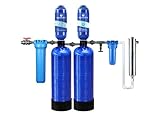 | Aquasana | PrimeEligible | |
| Add To Cart |  | AO Smith | PrimeEligible | |
| Add To Cart |  | Kazravan Enterprises LLC | PrimeEligible |
Water Softeners for Well Water Buying Guide
When Do I Need A Water Softener With Well Water?
Among the warning signs are:
- On solid surfaces such as sinks, toilets, shower stalls, and bathtubs, a white or light grey film
- Scale deposits in drain pipes (white chalky deposits)
- Tub and sink fixtures frequently become stuck or drain slowly when you turn off the water- showers or bathtubs start overflowing with water once they are empty.
- Leaks, rusting surrounding connections, with water arcing in the water heater indicate the need for a water softener.
- Soaps or laundry detergents don’t lather much when washing dishes or some stains don’t rinse away when cleaning dishes.
- The water doesn’t feel very soapy when doing laundry, and the clothes come out dirtier than before.
Do Well Water Softeners Work?
Well-water softeners use an ion-exchange method to remove all extra minerals, including “hardness” out from the water supply.
Based on the brand and manufacturer, many water softeners include mineral tanks with one or two brine tanks. Resin beads are present in the mineral tank, whereas salt is present in the salt tank. You can soften the complete water supply or simply the water volume based on the type.
Water softeners use an exchange mechanism of ions for water softening. The inclusion of resin beads causes this reaction. Water flows in the softener’s tank, colliding with resin beads.
These resin beads are charged in the other direction. This interaction successfully attracts all water particles, causing them to adhere with resin beads. It leads to the soft water production.
The softener undergoes an automatic renewal procedure after these beads become full of such particles. This procedure, commonly referred to as brining, uses water and a salt-brine combination to remove all particles within resin beads. It eliminates the possibility of recontamination and other issues.
This regeneration process normally completes at night and takes a few minutes, depending upon your model. Many water softeners consume roughly 50water gallons throughout this procedure.
How Do Conventional Salt-Based Well Water Softeners Work?
The water is softened by thousands of microscopic resin beads inside the tank, which filter away hard water pollutants. Salt is for cleaning resin beads throughout the regeneration cycle, causing the device to remove hardness off the water supply continuously.
Hard water particles are attracted to and held by resin beads inside the tank, then removed from the water.
The softened water leaves the tank then travels through the home’s plumbing.
Sodium upon the resin beads replaces with hard water mineral elements in softening cycle. These resin beads must be free from minerals than “recharged” after just a matter of time to begin attracting and accumulating hard water particles.
The following are the steps in water softener regeneration:
- A (brine of strong salty water) solution is generated with salt.
- This solution then circulates inside the resin tank, washing the beads and replacing hard water particles with new sodium.
- Both hard water particles plus brine solution are then drained out from the tank to a proximity drain.
- These resin beads have been rejuvenated and are now ready to gather hard water elements once more.
Salt-Based Water Softeners Vs. Salt-Free Water Conditioners
Salt-based water softeners are particularly effective at removing metal ions that cause hardness in water. The technique in these water softeners is ion exchange technology. Water softeners remove hardness minerals by swapping magnesium ions and calcium ions for sodium ions.
Instead of decreasing hard water ions, water softeners with salt-free (also called descalers or water conditioners) chemically change the minerals, causing them to cling together, eliminating scale buildup within the plumbing.
Salt-free water softeners do not effectively reduce the minerals inside the water, making it feel hard causing soap scum while leaving spots on dishes as well as surfaces.
A saltless water softener operates differently, treating hard water droplets to prevent the formation of limescale. They don’t use salt; they only treat with magnetic waves, filtration, or electromagnetic waves. As a result, you can remove limescale deposits and not hard water.
Benefits Of Water Softeners (Is It Important to Use Water Softener for Well Water?)
Dive in to have a look at the benefits of the water softeners.
Taking Out the Iron:
Several water softeners remove iron from the water supply, which is available in significant concentrations in the well water, in addition to magnesium and calcium. A significant concentration of iron inside the body is hazardous, causing harm to the skin, stomach, liver, kidney, heart, or pancreas.
Iron can discolor bathtubs, dishes, sinks, and showers, as well as clog drains. Adding the water softener ensures that the water from the well entering your home is iron-free, making it safe to use.
Corrosion Reduction:
This softening process avoids additional corrosion by removing corrosive heavy metals from water. Water softeners prevent the accumulation of leftover minerals upon various surfaces or within the pipes. The use of a water softener ensures that the pipes are unclogged, and that water flows freely.
Water Is Heated More Quickly:
It takes longer for hard water to heat compared to soft water. Adding a water softener to your water heater will heat it 22 percent faster. This increase in efficiency saves you money by reducing overall energy consumption.
Problems Of Using a Water Softener for Well Water:
Some problems of using a water softener for well water include the following:
Water Softener Issues with Brine Tank Water
A brine tank filled with water may be the most immediate concern for water softener customers. This is because of inadequate overflow or blockage. Multiple factors can play a part.
Problems With Water Softeners in The Salt Tank:
It’s time to replace your water softener: Such systems have an eight-year life expectancy, and after that, they begin to degrade rapidly. Inspect your system’s components to identify wear or tear damage, like cracks inside the tank or O-ring damage, if the system is getting old or you don’t know the age.
The Water Entrance Valve Is Damaged:
Water will continue to flow inside the salt tank if a valve is damaged. To fix the problem, replace the cover.
Water Level Controlled with Float Valve:
The float valve controls the water level inside the compartments, which is adjusted too high. Extra water may accumulate if set very high because the softener is released inadequately then. To resolve the situation, reduce its float valve.
Water Softeners Turn the Color of Water Brown:
The use of water softeners in the well water can make your water safe, but they turn water brown.
Apart from it, the use of water softener can cause certain issues, including:
- High cost
- salt cost
- maintenance cost
- room availability
- high water usage
- high electricity bill
- some water softeners are not environmental-friendly
- people might feel the tangy taste
- It serves as a risk factor for people who are restricted to consume sodium
What To Consider Before Purchasing a Well Water Softener
There are certain things that you need to consider while purchasing the well water softener:
Pre-Filtration:
Pre-filtration is necessary to identify whether your water is hard or not. Once you identify that the water is hard, you can choose the type of water softener. Water softeners help you eliminate all the hazardous content from the water, making it pure.
Sediment Filters:
Sediment Filter is available as independent filters either as a component of a bigger whole-house water filtering system. Spin-down plus cartridge sediment filters are the most prevalent forms of sediment filters.
Spin Down Filters:
This is a popular solution for filtering well water with large granules of salt and sand. Such filters are typically placed before a bigger well water filtration system, including an oxidation system.
Such filters resemble a giant pipette in terms of appearance. The name implies how it treats water which includes water entering the filter top and spinning in a centrifugal action. It successfully removes the silt by circulating the water from the filter.
Certain spin-down filters have a flush valve, which you’ll need to use to flush out the sediment regularly. Others offer automatic flushing. The lifespan of spin-down filters is usually longer.
Certain spin-down filters have a flush valve, which you’ll need to use to flush out the sediment regularly. Others offer automatic flushing. The lifespan of spin-down filters is longer.
Cartridge Sediment Filtration System:
First-stage filters are most typically seen in whole-housing water filters and reverse osmosis filtration. A spun-cartridge, as well as pleated-cartridge construction, may be used in these filters.
Such cylindrical filters provide the most comprehensive filtering by passing water through numerous layers of melted spun polypropylene. The micron-level in the outside layers of such filters is the greatest. It lowers for each layer into the filter’s center.
Apart from it, there are other filtration methods too for pre-filtering the water, including oxidation media, carbon filters, and so on!
Capacity and System Size:
The capacity of a water softener is usually expressed in terms of the number of particles your system can easily filter before requiring any regeneration cycle. Smaller water softeners can handle roughly 28,000 grains, whereas massive softener systems have a capacity of approximately 80,000 grains. A household with 3-4 people having a water softener should have a grain capacity between 32,000-40,000 grains.
Water Flow Rate:
Water flow capacities can range between 8,000 – 80,000 grains. The flow rate of the water softener is also determined by its size. Choosing a tiny system for your home is a bad idea because it wears out sooner due to the double workload for filtering the hard water.
Oversized units, on the other hand, are not suitable because they might be costly. Furthermore, there would be a large lag throughout regeneration times due to rare use, which could damage resin beads over a longer duration.
Choosing a device that can provide soft water for at least three days is excellent. This allows the softener to process a large amount of water before regenerating successfully.
System Control and Features:
The regenerative features plus controls are something to keep an eye out for. The timer and DIR controls are the two main characteristics.
The unit’s regeneration time can be set automatically using timer controls. This is more convenient because the machine performs this for you. If you don’t intend on regenerating, meanwhile, ensuring turning the timer off. Or else, the unit regenerates unnecessarily.
Demand-initiated regeneration, also known as (DIR), uses meters or electronics to “detect” the resin beads which need replacement. It is a convenient option for saving water.
Space Available for Softener:
All types of Water softeners do not occupy the same space in a home.
Magnetic descalers, for instance, are the tiniest and most compact equipment. These units normally will not have a resin or brine tank. They only need a connection with the exterior of the water pipe.
You don’t need extra space for better accessibility to a tank since electronic descalers don’t require maintenance.
Electronic descalers are slightly larger than water conditioners. It has TAC media normally held inside a single tank, which is where all conditioning takes place.
To store the tank comfortably, you’ll need ample lengthwise space. You’ll also need extra space to change the media, which isn’t a common task since most TAC media usually last around 8 years.
The largest are ion-exchange type water softeners, which have two tanks, including a resin tank as well as a brine tank. Because this is a chore you’ll frequently be conducting, you’ll need plenty of space to fill your brine tank using salt. You’ll also require resin beads replacement after every ten years.
When buying a twin-tank ion-exchange type of water softener, make sure you have enough space for three tanks, including two resin beads tanks with a salt tank.
Certifications:
Seek third-party certification ensuring water softeners based on the manufacturer’s claims. Independent certification organizations, such as the NSF, conduct rigorous testing of water systems, assuring both safety and quality.
NSF/ANSI Regulation 44 accreditation is available for salt-based residential water softening systems. The water softeners, which are NSF 44 certified, are proven to eliminate hardness under 1 grain for every gallon in tests.
Costs:
Everyone wants a perfect deal when buying the water softener, although saving money isn’t the greatest option. Evaluate the pricing as well as the performance of your water softener, ensuring that you choose one that not only fits your needs but also works for a lifetime and meets your budget.
Evaluate the pricing and the performance of your water softener that not only fits your needs but also works for a lifetime and meets your budget. A good softener will help reduce maintenance costs, saving you money over time.
Well Softener Installation & Maintenance
First and foremost, thoroughly read and follow the directions in the manual.
- Clean up all water lines before pouring water in the softening system by turning taps on, allowing the water to flow.
- Turn off the power of the water heater. The safer the situation, the better.
- Choosing the optimal location for your water softener seems critical since placing it in the wrong location can be extremely dangerous. Ascertain that the space is leveled and that the temperature is ideal.
- It’s now time for connecting the discharge tube with the water softener’s head.
- Assemble the components, such as bypass valve and copper tubing, as per the instructions (allowing water to run towards bypass valve).
- A brine tank will be built up next.
- After you’ve completed all this, restart the power supply, and perform a backwash cycle.
- After you’ve finished installing the water softener, double-check that the nuts, as well as screws, are securely fastened. Make sure there are no leaks inside the system.
FAQs
Do Water Softeners Use a Lot of Electricity?
Water softeners consume less electricity than you would think. A water softener uses about the same amount of energy as an alarm clock in a year, measuring around 70 kWh, or around $10 annually, based on US annual energy costs.
Do You Need a Special Water Softener for Well Water?
Through a method named “ion exchange,” a salt-based water softener eliminates high quantities of magnesium and calcium from the water. In this procedure, the hardness components (magnesium and calcium) are replaced with chloride and sodium, which “softens” down the well water.
How Do I Choose a Water Softener for My Well?
You should always evaluate the hardness of the well water before installing a water softener.
As per industry standards, if the water result is less than 1 or approximately 1 GPG (grains per gallon) containing calcium carbonate, the water is soft.
Anything beyond that level is deemed moderate or extremely hard based on its mineral content. Buy a water analysis kit or hire specialists to analyze you.
Which Brand of Water Softener Is the Best?
Unlike traditional salt-based water softener systems, Spring Well’s FutureSoft is a type of salt-free system. This stunning two-in-one technology softens and filters water.
Final Words
I hope you got your hands on the best water softener for your home. Comparing the features of the softeners will help you choose the best water softener for your home’s drinking and usage water.
So, without delaying any further, get your hands on the ultimate, highly effective water softener that gives you clean, healthy water.

